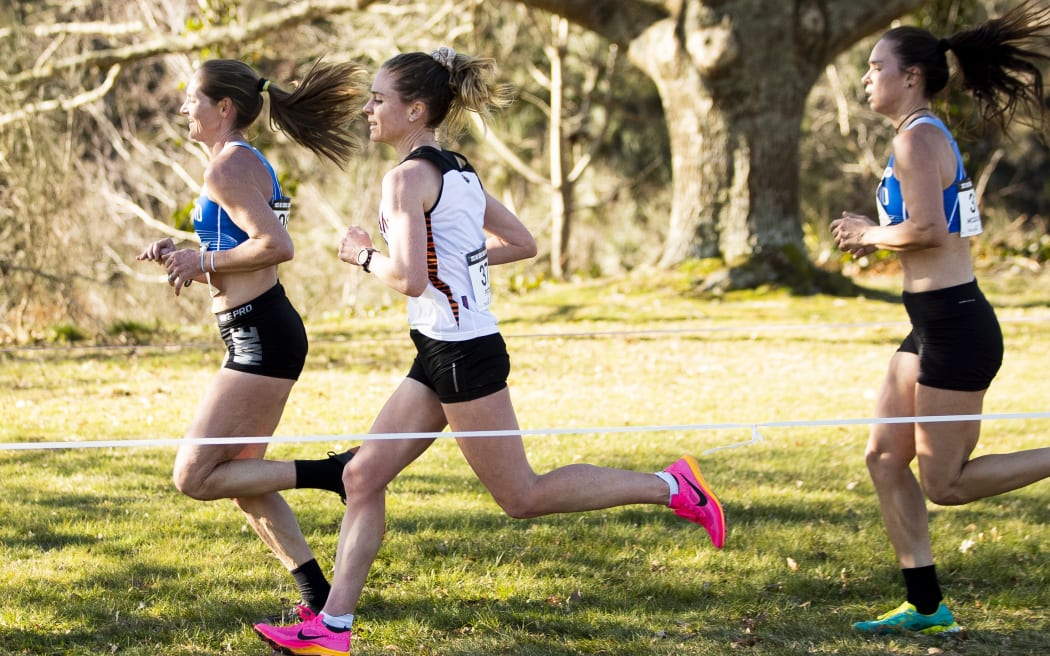Six years ago, Annika Pfitzinger was lying prone on a couch suffering from crippling headaches and inexplicable exhaustion.
She’d just come last in a race, a far cry from her recent personal best, a blistering 34 minutes over 10kms.
There was little relief when the diagnosis of chronic fatigue finally came.

Annika Pfitzinger has come back from crippling chronic fatigue to compete in the World Athletics Cross Country Championships in Belgrade. Photo: Supplied
Recovery would be years away, and it was a crushing blow for the 25-year-old who grew up in a household of elite athletes - mum Christine and Dad Peter are both former Olympic runners.
Now 31, Pfitzinger is set to represent her country on the world stage competing at the world cross country champs in Belgrade, Serbia at the end of this month.
She was in Boulder, Colorado one of her “favourite places in the world” in 2017 and was feeling good about her form, she tells Nine to Noon.
“I ran my personal best I think it was the 4th July and then I had another race scheduled for 4th August. One of the biggest races that I've ever been in, it was like a huge American and international elite field.
“And I knew I was fit. And I was very excited to race. But when I raced I just I felt absolutely awful. I had absolutely no energy, a pace that should have just been perfectly fine for me to handle just felt so hard and I ended up stopping and walking a couple of times.
“I made it to the finish line, but I came dead last.”
For an athlete at the top of her game, it was something of an embarrassment, she says.
“I figured I probably had low iron, because if I'm anaemic, that's probably what it would feel like.
“I ended up getting blood tests and actually my iron levels were excellent. So, I wasn't too sure what was going on there, we thought maybe I might have had a bit of a virus. So, we took it easy for a little bit.”
She had another race scheduled for a few weeks later, and that didn’t go well either, she says.
“I felt the same way in that race - absolutely horrendous. And I ended up pulling out after a couple of kms, I just had zero energy.”
Her symptoms started to deteriorate further, she says.
“I got absolutely exhausted, like walking upstairs was hard. And I ended up developing chronic headaches, absolutely debilitating headaches, which was quite scary.”
A raft of medical tests followed to try and get to the bottom of what was laying her low.
She returned to New Zealand and after 6 months was officially diagnosed with chronic fatigue syndrome.
“The general way that you get diagnosed is you rule out everything else that it could possibly be.
“And then if you've been more tired than usual for over six months, they label you with chronic fatigue syndrome, which is a pretty frustrating diagnosis really, because there's no universal way to help chronic fatigue.”
Her GP told her she needed rest, she says.
“You have chronic fatigue; you need to rest. We don't really know what else you can do beyond that. You may start feeling better in two years, you may not.”
- Related: Long Covid and ME/CFS are the same illness, researcher says
- Related: Research grant boost for chronic fatigue syndrome
- Related: When disease research gets personal
She believes the reason she got chronic fatigue syndrome was multi-faceted.
“It was a combination of training quite hard up at altitude. We think I may have had glandular fever in my system at some point. And then also, I was going through a bit of psychological stress at the time.
“So, mentally, I wasn't very good, either. I think the combination of all those things just completely overwhelmed my system.”
Some hard weeks and months followed, she says.
“Running was taken away from me, but also so many other things that I enjoy, because I was just so fatigued, I couldn't bake, I couldn't cook, hanging out with friends was really, really exhausting.
“I was living with my parents, so they helped me immensely. And then, my friend who then became my partner, Julian, he also really helped me through it. And they were all very patient with me. They were amazing, because I was not a very pleasant person to be around for quite a while there.”
It wasn’t until 2022 that she started to feel better, she says, after a few false dawns. She eased back in running in 2021 and even competed in a race but it was too soon, she says.
“I relapsed for a few months after that, and I guess it was 2022 when I started to feel like I could do a little bit more running and take it a tiny bit more seriously.”
Looking after her mental health has helped her physical recovery, she says. She has had help from a psychologist and takes medication for anxiety.
“When you're constantly in a state of fight or flight because you're anxious it's not going to help your fatigue levels at all.
“Once I started to work on that and get my mental health sorted that's when I started to see improvements in my physical energy levels.”
Now, in her early 30s, she’s back and about to represent her country.
“It's pretty amazing to see there's been this huge shift where, women in their 30s or even early to mid-40s are at the peak of their careers, especially in the longer events like the marathon.
“So yeah, it's pretty exciting to see that I could still have a very long career ahead of me.”

